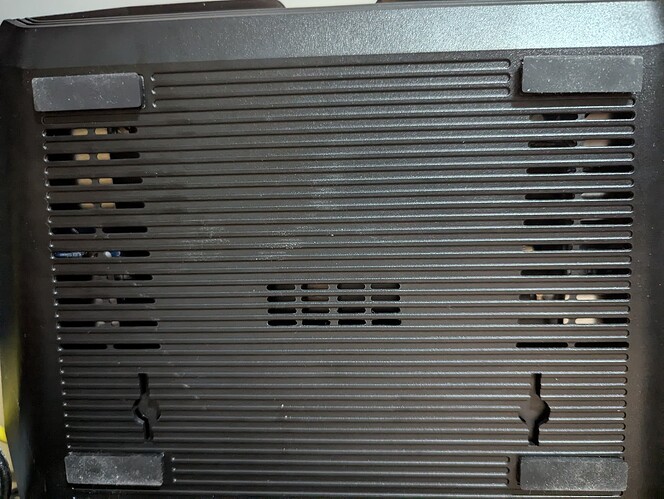I think that the problem with variables is caused by errors in dts files:
/git/openwrt/build_dir/target-aarch64_cortex-a53_musl/linux-qualcommax_ipq807x/linux-6.6.47/arch/arm64/boot/dts/qcom/ipq8074-rt-ax89x.dts:564.5-15: Warning (reg_format): /soc@0/mdio@90000/switch@10/ports/port@0:reg: property has invalid length (4 bytes) (#address-cells == 2, #size-cells == 1)
/git/openwrt/build_dir/target-aarch64_cortex-a53_musl/linux-qualcommax_ipq807x/linux-6.6.47/arch/arm64/boot/dts/qcom/ipq8074-rt-ax89x.dts:572.5-15: Warning (reg_format): /soc@0/mdio@90000/switch@10/ports/port@1:reg: property has invalid length (4 bytes) (#address-cells == 2, #size-cells == 1)
/git/openwrt/build_dir/target-aarch64_cortex-a53_musl/linux-qualcommax_ipq807x/linux-6.6.47/arch/arm64/boot/dts/qcom/ipq8074-rt-ax89x.dts:578.5-15: Warning (reg_format): /soc@0/mdio@90000/switch@10/ports/port@2:reg: property has invalid length (4 bytes) (#address-cells == 2, #size-cells == 1)
/git/openwrt/build_dir/target-aarch64_cortex-a53_musl/linux-qualcommax_ipq807x/linux-6.6.47/arch/arm64/boot/dts/qcom/ipq8074-rt-ax89x.dts:584.5-15: Warning (reg_format): /soc@0/mdio@90000/switch@10/ports/port@3:reg: property has invalid length (4 bytes) (#address-cells == 2, #size-cells == 1)
/git/openwrt/build_dir/target-aarch64_cortex-a53_musl/linux-qualcommax_ipq807x/linux-6.6.47/arch/arm64/boot/dts/qcom/ipq8074-rt-ax89x.dts:590.5-15: Warning (reg_format): /soc@0/mdio@90000/switch@10/ports/port@4:reg: property has invalid length (4 bytes) (#address-cells == 2, #size-cells == 1)
/git/openwrt/build_dir/target-aarch64_cortex-a53_musl/linux-qualcommax_ipq807x/linux-6.6.47/arch/arm64/boot/dts/qcom/ipq8074-rt-ax89x.dts:596.5-15: Warning (reg_format): /soc@0/mdio@90000/switch@10/ports/port@5:reg: property has invalid length (4 bytes) (#address-cells == 2, #size-cells == 1)
/git/openwrt/build_dir/target-aarch64_cortex-a53_musl/linux-qualcommax_ipq807x/linux-6.6.47/arch/arm64/boot/dts/qcom/ipq8074-rt-ax89x.dts:602.5-15: Warning (reg_format): /soc@0/mdio@90000/switch@10/ports/port@6:reg: property has invalid length (4 bytes) (#address-cells == 2, #size-cells == 1)
/git/openwrt/build_dir/target-aarch64_cortex-a53_musl/linux-qualcommax_ipq807x/linux-6.6.47/arch/arm64/boot/dts/qcom/ipq8074-rt-ax89x.dts:517.27-520.4: Warning (unit_address_format): /soc@0/mdio@90000/ethernet-phy@05: unit name should not have leading 0s
/git/openwrt/build_dir/target-aarch64_cortex-a53_musl/linux-qualcommax_ipq807x/image-ipq8074-rt-ax89x.dtb: Warning (pci_device_reg): Failed prerequisite 'reg_format'
/git/openwrt/build_dir/target-aarch64_cortex-a53_musl/linux-qualcommax_ipq807x/image-ipq8074-rt-ax89x.dtb: Warning (pci_device_bus_num): Failed prerequisite 'reg_format'
/git/openwrt/build_dir/target-aarch64_cortex-a53_musl/linux-qualcommax_ipq807x/image-ipq8074-rt-ax89x.dtb: Warning (i2c_bus_reg): Failed prerequisite 'reg_format'
/git/openwrt/build_dir/target-aarch64_cortex-a53_musl/linux-qualcommax_ipq807x/image-ipq8074-rt-ax89x.dtb: Warning (spi_bus_reg): Failed prerequisite 'reg_format'
/git/openwrt/build_dir/target-aarch64_cortex-a53_musl/linux-qualcommax_ipq807x/linux-6.6.47/arch/arm64/boot/dts/qcom/ipq8074-rt-ax89x.dts:563.11-569.6: Warning (avoid_default_addr_size): /soc@0/mdio@90000/switch@10/ports/port@0: Relying on default #address-cells value
/git/openwrt/build_dir/target-aarch64_cortex-a53_musl/linux-qualcommax_ipq807x/linux-6.6.47/arch/arm64/boot/dts/qcom/ipq8074-rt-ax89x.dts:563.11-569.6: Warning (avoid_default_addr_size): /soc@0/mdio@90000/switch@10/ports/port@0: Relying on default #size-cells value
/git/openwrt/build_dir/target-aarch64_cortex-a53_musl/linux-qualcommax_ipq807x/linux-6.6.47/arch/arm64/boot/dts/qcom/ipq8074-rt-ax89x.dts:571.11-575.6: Warning (avoid_default_addr_size): /soc@0/mdio@90000/switch@10/ports/port@1: Relying on default #address-cells value
/git/openwrt/build_dir/target-aarch64_cortex-a53_musl/linux-qualcommax_ipq807x/linux-6.6.47/arch/arm64/boot/dts/qcom/ipq8074-rt-ax89x.dts:571.11-575.6: Warning (avoid_default_addr_size): /soc@0/mdio@90000/switch@10/ports/port@1: Relying on default #size-cells value
/git/openwrt/build_dir/target-aarch64_cortex-a53_musl/linux-qualcommax_ipq807x/linux-6.6.47/arch/arm64/boot/dts/qcom/ipq8074-rt-ax89x.dts:577.11-581.6: Warning (avoid_default_addr_size): /soc@0/mdio@90000/switch@10/ports/port@2: Relying on default #address-cells value
/git/openwrt/build_dir/target-aarch64_cortex-a53_musl/linux-qualcommax_ipq807x/linux-6.6.47/arch/arm64/boot/dts/qcom/ipq8074-rt-ax89x.dts:577.11-581.6: Warning (avoid_default_addr_size): /soc@0/mdio@90000/switch@10/ports/port@2: Relying on default #size-cells value
/git/openwrt/build_dir/target-aarch64_cortex-a53_musl/linux-qualcommax_ipq807x/linux-6.6.47/arch/arm64/boot/dts/qcom/ipq8074-rt-ax89x.dts:583.11-587.6: Warning (avoid_default_addr_size): /soc@0/mdio@90000/switch@10/ports/port@3: Relying on default #address-cells value
/git/openwrt/build_dir/target-aarch64_cortex-a53_musl/linux-qualcommax_ipq807x/linux-6.6.47/arch/arm64/boot/dts/qcom/ipq8074-rt-ax89x.dts:583.11-587.6: Warning (avoid_default_addr_size): /soc@0/mdio@90000/switch@10/ports/port@3: Relying on default #size-cells value
/git/openwrt/build_dir/target-aarch64_cortex-a53_musl/linux-qualcommax_ipq807x/linux-6.6.47/arch/arm64/boot/dts/qcom/ipq8074-rt-ax89x.dts:589.11-593.6: Warning (avoid_default_addr_size): /soc@0/mdio@90000/switch@10/ports/port@4: Relying on default #address-cells value
/git/openwrt/build_dir/target-aarch64_cortex-a53_musl/linux-qualcommax_ipq807x/linux-6.6.47/arch/arm64/boot/dts/qcom/ipq8074-rt-ax89x.dts:589.11-593.6: Warning (avoid_default_addr_size): /soc@0/mdio@90000/switch@10/ports/port@4: Relying on default #size-cells value
/git/openwrt/build_dir/target-aarch64_cortex-a53_musl/linux-qualcommax_ipq807x/linux-6.6.47/arch/arm64/boot/dts/qcom/ipq8074-rt-ax89x.dts:595.11-599.6: Warning (avoid_default_addr_size): /soc@0/mdio@90000/switch@10/ports/port@5: Relying on default #address-cells value
/git/openwrt/build_dir/target-aarch64_cortex-a53_musl/linux-qualcommax_ipq807x/linux-6.6.47/arch/arm64/boot/dts/qcom/ipq8074-rt-ax89x.dts:595.11-599.6: Warning (avoid_default_addr_size): /soc@0/mdio@90000/switch@10/ports/port@5: Relying on default #size-cells value
/git/openwrt/build_dir/target-aarch64_cortex-a53_musl/linux-qualcommax_ipq807x/linux-6.6.47/arch/arm64/boot/dts/qcom/ipq8074-rt-ax89x.dts:601.11-608.6: Warning (avoid_default_addr_size): /soc@0/mdio@90000/switch@10/ports/port@6: Relying on default #address-cells value
/git/openwrt/build_dir/target-aarch64_cortex-a53_musl/linux-qualcommax_ipq807x/linux-6.6.47/arch/arm64/boot/dts/qcom/ipq8074-rt-ax89x.dts:601.11-608.6: Warning (avoid_default_addr_size): /soc@0/mdio@90000/switch@10/ports/port@6: Relying on default #size-cells value
/git/openwrt/build_dir/target-aarch64_cortex-a53_musl/linux-qualcommax_ipq807x/linux-6.6.47/arch/arm64/boot/dts/qcom/ipq8072-wpq873.dts:472.13-477.4: Warning (pci_device_reg): /soc@0/pci@10000000/bridge@1,0: PCI unit address format error, expected "0,0"
/git/openwrt/build_dir/target-aarch64_cortex-a53_musl/linux-qualcommax_ipq807x/linux-6.6.47/arch/arm64/boot/dts/qcom/ipq8072-haze.dts:302.13-317.4: Warning (pci_device_reg): /soc@0/pci@10000000/bridge@1,0: PCI unit address format error, expected "0,0"
/git/openwrt/build_dir/target-aarch64_cortex-a53_musl/linux-qualcommax_ipq807x/linux-6.6.47/arch/arm64/boot/dts/qcom/ipq8072-ax9000.dts:565.13-581.4: Warning (pci_device_reg): /soc@0/pci@10000000/bridge@1,0: PCI unit address format error, expected "0,0"
/git/openwrt/build_dir/target-aarch64_cortex-a53_musl/linux-qualcommax_ipq807x/linux-6.6.47/arch/arm64/boot/dts/qcom/ipq8074-nbg7815.dts:240.7-28: Warning (reg_format): /soc@0/spi@78b5000/flash@0/partitions/partition@650000/nvmem-layout/aqr-fw@0:reg: property has invalid length (8 bytes) (#address-cells == 2, #size-cells == 1)
/git/openwrt/build_dir/target-aarch64_cortex-a53_musl/linux-qualcommax_ipq807x/image-ipq8074-nbg7815.dtb: Warning (pci_device_reg): Failed prerequisite 'reg_format'
/git/openwrt/build_dir/target-aarch64_cortex-a53_musl/linux-qualcommax_ipq807x/image-ipq8074-nbg7815.dtb: Warning (pci_device_bus_num): Failed prerequisite 'reg_format'
/git/openwrt/build_dir/target-aarch64_cortex-a53_musl/linux-qualcommax_ipq807x/image-ipq8074-nbg7815.dtb: Warning (i2c_bus_reg): Failed prerequisite 'reg_format'
/git/openwrt/build_dir/target-aarch64_cortex-a53_musl/linux-qualcommax_ipq807x/image-ipq8074-nbg7815.dtb: Warning (spi_bus_reg): Failed prerequisite 'reg_format'
/git/openwrt/build_dir/target-aarch64_cortex-a53_musl/linux-qualcommax_ipq807x/linux-6.6.47/arch/arm64/boot/dts/qcom/ipq8074-nbg7815.dts:238.23-241.8: Warning (avoid_default_addr_size): /soc@0/spi@78b5000/flash@0/partitions/partition@650000/nvmem-layout/aqr-fw@0: Relying on default #address-cells value
/git/openwrt/build_dir/target-aarch64_cortex-a53_musl/linux-qualcommax_ipq807x/linux-6.6.47/arch/arm64/boot/dts/qcom/ipq8074-nbg7815.dts:238.23-241.8: Warning (avoid_default_addr_size): /soc@0/spi@78b5000/flash@0/partitions/partition@650000/nvmem-layout/aqr-fw@0: Relying on default #size-cells value
Pseudo file "dev" exists in source filesystem "/git/openwrt/build_dir/target-aarch64_cortex-a53_musl/root-qualcommax/dev".
Ignoring, exclude it (-e/-ef) to override.
/git/openwrt/build_dir/target-aarch64_cortex-a53_musl/linux-qualcommax_ipq807x/tmp/openwrt-qualcommax-ipq807x-netgear_rax120v2-initramfs-uImage.itb.its:48.15-55.5: Warning (unit_address_vs_reg): /configurations/config@hk01: node has a unit name, but no reg or ranges property
/git/openwrt/build_dir/target-aarch64_cortex-a53_musl/linux-qualcommax_ipq807x/netgear_rax120v2-uImage.itb.its:48.15-55.5: Warning (unit_address_vs_reg): /configurations/config@hk01: node has a unit name, but no reg or ranges property
but I'm not sure how to fix that.
Config:
configurations {
default = "config@hk01";
config@hk01 {
description = "OpenWrt netgear_rax120v2";
kernel = "kernel-1";
fdt = "fdt-1";
};
};

